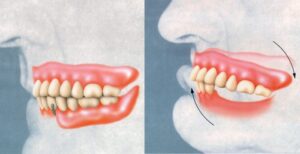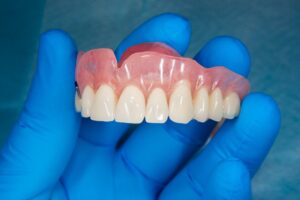Denture fitting and repair are essential steps in maintaining a confident, comfortable smile. Whether you’re new to dentures or need adjustments to improve comfort, a precise fit ensures proper functionality and helps prevent irritation. Over time, natural wear and changes in your mouth shape can impact how your dentures fit, making regular check-ups and repairs important for a seamless, natural look and feel.
Getting the right fit for your dentures is key for comfort and function. When dentures don’t fit well, they can cause pain and make it hard to eat or speak. This guide will help you understand how to get your dentures fitted properly and what to do if they need repair.
Key Takeaways
- Denture fitting is important for comfort and function.
- You should see your dentist if your dentures feel loose or cause pain.
- Repairs can be made for broken or ill-fitting dentures.
- Regular check-ups help keep your dental health in check.
- Learn more about denture cleaning solutions to maintain your dentures.
What Are Denture Fitting and Repair?

Denture fitting and repair involve the process of creating, adjusting, and maintaining dentures to ensure they are comfortable, functional, and aesthetically pleasing. Here’s a breakdown:
- Denture Fitting: This is the initial stage where a dentist or prosthodontist takes measurements and impressions of your mouth to create custom-made dentures that fit comfortably. Proper fitting is crucial, as ill-fitting dentures can lead to discomfort, sores, difficulty eating, and even speech issues. During fitting, adjustments may be made to ensure the dentures align correctly with your gums and jaw.
- Denture Repair: Over time, dentures can become worn, cracked, or damaged. Regular repairs address issues like chips, fractures, or weakened areas, restoring the dentures’ functionality and appearance. Sometimes, adjustments may also be needed due to natural changes in the mouth’s structure, ensuring the dentures remain snug and supportive.
Both fitting and repair are key to maintaining denture effectiveness, comfort, and appearance, helping to support a natural-looking smile and ease in daily activities.
Dentures are removable replacements for missing teeth. They can be full or partial. Full dentures replace all the teeth, while partial dentures fill in gaps when some teeth are still there. They help you chew food better and give your face a fuller look.
Why Fitting Matters
A good fit is key. Well-fitted dentures stay in place and feel comfortable. If your dentures are too loose, they can slide around. This can lead to sores in your mouth. If they are too tight, they can cause pain and discomfort.
Signs You Need a Fitting
- Loose dentures: If your dentures move around when you eat or talk, it’s time for a fitting.
- Pain: If you feel sore spots or pain, get them checked.
- Change in shape: Your mouth can change, especially after losing teeth. This can affect how well your dentures fit.
The Fitting Process

Getting your dentures fitted typically involves a few steps.
Initial Consultation
During your first visit, the dentist will take a close look at your mouth. They will get information about your dental health and your smile goals. This helps in making dentures that look good and feel right.
Molding Your Mouth
Next, the dentist will make molds of your mouth. This is to create dentures that match your mouth’s shape. The more accurate the mold, the better your dentures will fit.
Fitting the Dentures
After your dentures are made, you will return to the office for a fitting. The dentist will check how they sit in your mouth. They may make small adjustments to ensure the best fit.
Final Checks
Once the fit is just right, the dentist will review how to care for your new dentures. They will show you how to clean them and what foods to avoid at first.
| Type of Dentures | Description | Benefits |
|---|---|---|
| Full Dentures | Replace all teeth in the upper or lower jaw | Improved aesthetics and function |
| Partial Dentures | Fill in gaps where some natural teeth remain | Retain remaining teeth, easier eating |
| Immediate Dentures | Placed right after tooth extraction | Instant solution while healing |
| Overdentures | Fit over remaining natural teeth or implants | Increased stability and comfort |
Common Denture Problems
Even with a good fit, you might face issues. Knowing these problems can help you find solutions faster.
Ill-Fitting Dentures
Sometimes, your dentures can become loose over time. This might happen due to changes in your mouth. Regular check-ups with your dentist can help catch these issues early.
Broken Dentures
Accidents happen. If your dentures crack or break, don’t try to fix them yourself. Always see your dentist for repairs.
Stains on Dentures
Just like natural teeth, dentures can stain. You should clean them daily to keep them looking bright.
Repairing Your Dentures
If your Denture fitting and repair, there are a few options.
Types of Denture Fitting and Repair
- Minor fixes: This includes small cracks or loose parts. These can often be fixed in one visit.
- Major repairs: If your dentures are broken in many places, it may take longer to fix them. Your dentist will explain the timeline.
How Repairs Work
When you visit your dentist for denture fitting and repair, they will assess the situation. They may take the dentures and make the necessary adjustments or replacements right there.
Benefits of Regular Check-Ups
Regular dental check-ups are key for keeping your dentures in good shape.
Why You Should Visit Often
- Adjustments: Your dentist can make adjustments to your dentures as needed.
- Oral health: Your dentist will check your overall mouth health, making sure everything is okay.
- Prevent problems: Regular visits help catch issues before they become serious.
| Common Issues with Dentures | Possible Causes | Recommended Action |
|---|---|---|
| Loose Fit | Weight loss or bone loss | Schedule an adjustment |
| Stains | Food and drink consumption | Use denture cleaner or consult a dentist |
| Sore Spots | Ill-fitting dentures | Visit a dentist for an assessment |
Caring for Your Dentures
Keeping your dentures clean is vital. Here are some tips.
Daily Cleaning
- Rinse your dentures: After eating, rinse them to remove food particles.
- Brush daily: Use a soft brush to clean your dentures. Don’t use regular toothpaste. It can scratch them.
Soaking
You should soak your dentures overnight in a cleaning solution. This helps keep them moist and free from stains.
What to Avoid
- Hot water: Never use hot water. It can warp your dentures.
- Bleach: Avoid bleach and strong cleaners. They can damage your dentures.
Additional Care Tips
- Avoid sticky foods: These can dislodge dentures.
- Cut food into small pieces: This makes chewing easier.
- Use denture adhesive: If needed, this can help keep them secure.
Troubleshooting Common Issues
You might face some common problems with your dentures. Here’s what to do.
Loose Dentures
If your dentures feel loose, schedule an appointment with your dentist. They can make necessary adjustments.
Sore Spots
If you feel pain or sores in your mouth, reach out to your dentist. They can help you find a solution.
Stains
If your dentures get stained, try soaking them in a denture cleaner. If stains persist, see your dentist.
Conclusion
Proper denture fitting and timely repairs are essential for comfort, function, and overall oral health. Well-fitted dentures improve speaking, eating, and confidence, while regular maintenance prevents discomfort and prolongs their lifespan. By investing in high-quality fitting and repair, you can ensure a secure and natural-looking smile that supports a better quality of life.
Denture fitting and repair can greatly enhance your quality of life. A good fit allows you to smile, eat, and talk without worry. If you ever face issues, don’t hesitate to reach out to your dentist. Regular check-ups and good care will keep your smile bright and healthy.
Ensure your dentures fit comfortably and securely—don’t let poor fittings hold you back! Schedule your fitting or repair appointment today for a smile that feels natural and boosts your confidence. Contact us now to get started
